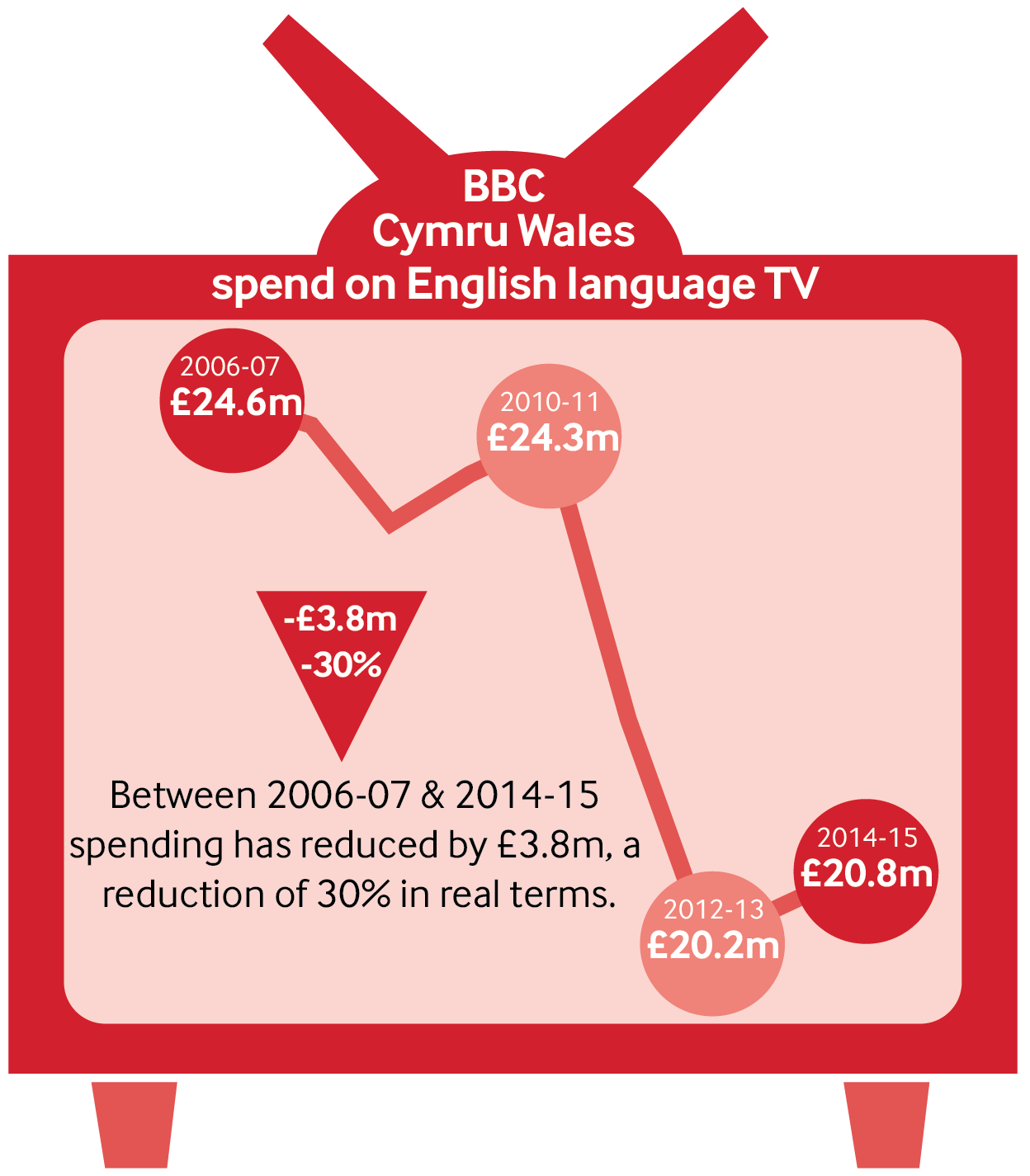On Wednesday 13 July the National Assembly for Wales will debate a motion noting with regret the reduction in BBC Cymru Wales spend on English language television over the last decade. The UK Government is currently in the process of renewing the BBC’s Charter. What is the BBC Charter, and what does this have to do with Wales?
The BBC Charter is the constitutional basis of the BBC. It preserves the BBC’s independence from government and outlines the duties of the BBC Trust and the Executive Board. The first Charter ran from 1927-1936. The current Charter came into force in 2006 and is due to expire on 31 December 2016.
Alongside the Charter there is an agreement which is signed by the Secretary of State for Culture, Media and Sport which goes into more detail in regards to topics found in the Charter.
What is the Charter Review?
Charter reviews tend to take place about every 10 years and are an opportunity for stakeholders to have an input into how the BBC is organised and regulated and how it can best serve the public. The new Charter is expected to be in place in the beginning of January 2017.
The review has included a large scale public consultation which received almost 200,000 responses as well as a public opinion study focusing on the views of under-represented groups. 300 organisations from around the UK were involved in the Charter review process. The UK Government also commissioned an independent review of governance and regulation which was led by Sir David Clementi.
The next charter period will run for 11 years until 31 December 2027, with provisions for a mid-term review.
BBC in Wales
The Fourth Assembly’s Communities, Equality and Local Government (CELG) Committee published the findings of its inquiry into the BBC Charter review in March 2016.
The Committee heard that between 2006-7 and 2014-15 BBC Cymru Wales spend on English language TV output for Welsh audiences reduced from £24.6 million to £20.8 million: a reduction of about 30% in real terms.
Over a similar period, BBC network spend increased in Wales, to the extent that in 2014-15 Wales secured 7.8% – or £59.1 million – of UK BBC network television spend, greater than its 4.9% population share. However, stakeholders felt that, welcome though this spend in Wales was, the network programmes made with it did little to address specifically Welsh issues.

The Committee’s concerns about Welsh representation on the BBC, and some if its proposals to address this problem, are summarised in a previous Research Service blog post.
Many of the views expressed by the Committee have subsequently also been expressed in the following reports:
- Welsh Affairs Committee: Broadcasting in Wales (June 2016)
- A future for public service broadcasting: inquiry chaired by Lord Puttnam (June 2016)
Since the publication of the Committee’s report, BBC Director-General Lord Hall wrote a letter providing an update on BBC plans to improve the performance of the BBC in the devolved nations. These plans include:
- A drama commissioner in each nation;
- Setting portrayal objectives;
- Spending more on English-language broadcasting in the nations, with a particular focus on Wales;
- Ongoing work to improve news coverage, including a Nations News Review. The BBC is also working on plans to provide funding to local journalists to provide reporting for use by the BBC and other news providers.
- New governance structures, including a representative for each nation on the new BBC Board, and a “licence” for each nation. These licences would describe the services the BBC intends to provide in each nation.
In June 2016 Alun Davies AM, Minister for Lifelong Learning and Welsh Language (who also has responsibility for broadcasting policy), announced the establishment of a new independent media forum for Wales. This was recommended in the CELG report.
BBC white paper
At the same time as Lord Hall wrote his letter, the UK Government Department for Culture, Media and Sport (DCMS) published a white paper, “A BBC for the future: A broadcaster of distinction”.
The white paper contains a number of proposals on different areas of the BBC’s operations, remit and regulation. It proposes new public purposes for the BBC, including that of “reflecting, representing and serving the diverse communities of all of the UK’s nations and regions.”
S4C
Until April 2013, S4C’s funding was provided by the DCMS through a grant linked to inflation. Since then, the majority of S4C’s funding has been provided via the licence fee through the BBC Trust, with the DCMS continuing to provide a small grant. The white paper sets out that “in the new charter period it is important that the funding and accountability arrangements in place between the two continue to protect the independence of both parties and provide certainty and clarity of funding for S4C.”
The UK Government is undertaking a review of S4C in 2017 which will look into S4C’s remit, accountability and governance. On that point, the CELG report stated that the future funding needs of S4C should be “considered on its own merit and separate to the BBC’s overall service provision for Wales”.
Going Forward
The draft Charter is expected to be published over the summer. It will then be subject to Parliamentary debate in Westminster, and will be of key interest to the Assembly’s new Culture, Welsh Language and Communications Committee. The new Charter should then enter into force on January 1 2017.
Article by Madelaine Phillips, National Assembly for Wales Research Service




